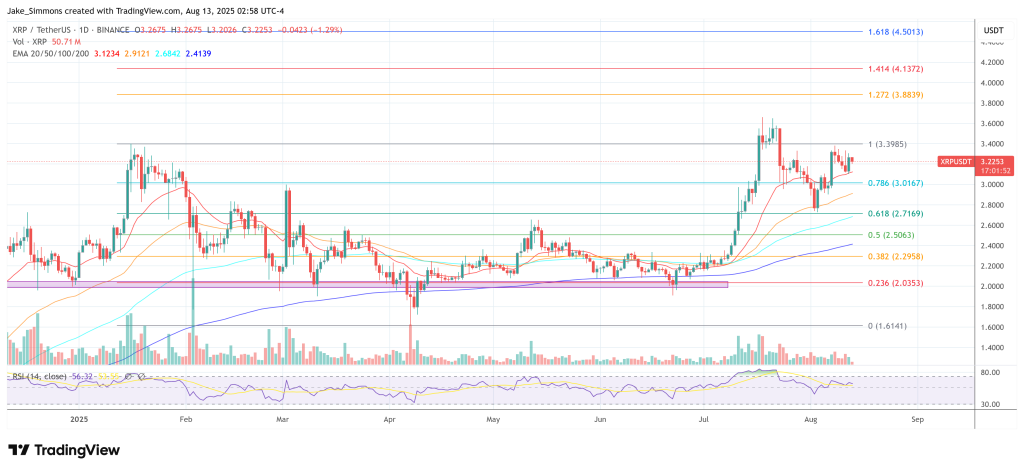A fresh flare-up over XRP’s oft-repeated “ISO 20022 compliance” claim is forcing a basic but consequential distinction back into view: Ripple, the private company that builds enterprise payment software, is not the XRP Ledger, the open, decentralized network that settles XRP transactions. The latest round was ignited by investor Jake Claver, who asserted that “before any other cryptocurrency, XRP prioritized… ISO 20022 compliance,” adding that “the network processes more than $434 billion in transactions every day,” and casting ISO 20022 as the bridge that will let Ripple “tokenize and transfer massive volumes of assets” across banking rails. Claver’s post went viral. It also drew a categorical rebuttal from Matt Hamilton, Ripple’s former Director of Developer Relations.
XRP–ISO 20022 Claims Debunked
Hamilton did not mince words. “XRP did not prioritise ISO20022 whatsoever. There is literally nothing in the XRP Ledger codebase or network that has anything at all to do with ISO20022. It has been entirely a charade perpetuated by scammers like yourself,” he wrote on August 12. The stark phrasing reprises a line he has taken for years against the meme of “ISO-compliant coins,” arguing that ISO 20022 is a financial messaging standard used by institutions—not a property a token can possess.
The pushback did not stop there. After another account claimed that “to be able to initiate [ISO 20022], [cryptocurrencies] need to have an API and only selected few have that API ready,” Hamilton agreed with the premise about messaging but drew the same boundary line: “Correct. And the XRP Ledger does not have that API.” When a separate user argued that Ripple is a member of the ISO 20022 standards community and uses the format on RippleNet, “primarily for ODL,” Hamilton replied that such interoperability belongs to Ripple’s software stack, not to the ledger itself: “RippleNet can work with ISO20022 compliant messages. But the XRP Ledger has no such functionality.”
Claver subsequently acknowledged that “the post should have said ‘Ripple’ in the first sentence,” accepting the core correction while defending the broader thesis that ISO 20022-aligned infrastructure can funnel value into crypto settlement layers. Hamilton wasn’t persuaded: “Replace ‘XRP’ with ‘Ripple’ and the tweet makes even less sense,” he countered, objecting to the leap from enterprise messaging alignment to claims about tokenization and XRP’s role by default.
Underneath the social-media heat is a definitional point the industry has struggled to communicate. ISO 20022 is an international methodology and data dictionary for financial messages—think payments, securities, trade, FX—that enables richer, structured, machine-readable payloads across banks and market infrastructures. It standardizes how messages are modeled and carried, not how value is represented on a blockchain. That is why standards bodies and market infrastructures—SWIFT for cross-border payments, central banks for high-value domestic rails—speak about ISO 20022 in terms of message schemas, migration timelines, and coexistence windows, not tokens.
That context also explains why Ripple’s corporate announcements reference ISO 20022 at the network-integration layer. Ripple joined the ISO 20022 Registration Management Group in 2020, billing itself as the first DLT-focused participant and positioning RippleNet’s single API and data model to interoperate with banks’ ISO-native flows. None of that turns the asset into an “ISO-compliant coin,” because compliance, in this domain, attaches to message formats, systems integration, and operational processes.
None of this means XRP cannot be used in workflows that originate from ISO 20022-formatted instructions. Hamilton himself has repeatedly said anyone can make payments on the ledger, and that RippleNet can translate ISO 20022 messages into whatever internal calls are needed to orchestrate settlement, including ODL-style flows that source and settle liquidity with the token. What he objects to is the rhetorical shortcut that collapses corporate messaging compliance into token-level attributes, particularly when it is leveraged to imply privileged regulatory status or inevitable valuation upside.
At press time, XRP traded at $3.22.
